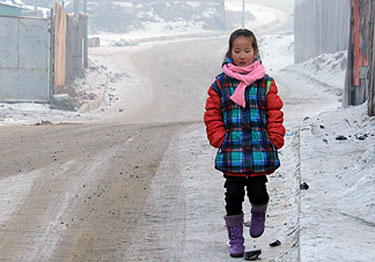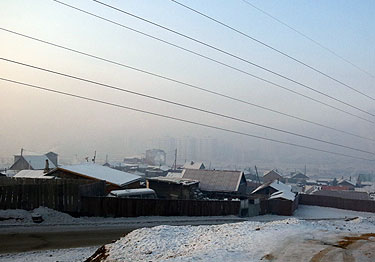Air pollution is endangering children’s health in Mongolia
By Enkhzul Altangerel: In Ulaanbaatar, Mongolia, children like Nandin-Erdene face air so dense with pollution that they cannot view the colour of traffic lights. See what the air quality means for children’s health, and learn what UNICEF and partners are doing to cut through the smog.
ULAANBAATAR, Mongolia, 22 February 2016 – “When I go to school, it is very smoggy and I can’t see anything. When I cross the road in the morning on my way to school, I can’t tell if the light is red or green,” says Nandin-Erdene, her cheeks red from the cold.
The 9-year-old girl lives with her parents and siblings in a ger district, an area that does not benefit from urban planning or most basic services, in Ulaanbaatar, the capital city of Mongolia. Like 200,000 other households in the peri-urban areas, Nandin-Erdene’s family burn raw coal for heating and cooking during the winter – during which time temperatures can plummet to –40 °C.
Coal combustion and a high smoking rate have brought considerable indoor and outdoor air pollution, the dense curtain through which Nandin-Erdene tries to cross the street.
The air Nandin-Erdene breathes

Schoolchildren like Nandin-Erdene breathe in heavily polluted air not only in the streets, but also at both school and home. Ulaanbaatar is among the 10 most polluted cities in the world. Air pollution levels in the ger have reached dangerous levels: 2011 data showed that fine particulate matter, or PM 2.5, which increases the risk of respiratory infections among children, is usually 6–7 times higher than World Health Organization standards allow. The measurement can peak at up to 25 times the allowance, in December.
“My children get flu and sore throat very often during winter. I think that it’s because of the air pollution,” says Nandin-Erdene’s mother Khongorzul. Because of the smog, my throat burns and it gets sore,” agrees Nandin-Erdene. “I get sick often. “I heard that smog is very bad for health. It makes lungs and other organs sick.” “I am worried more about the long-term effects,” says Khongorzul. “I don’t know what will happen to them in the future.” Nandin-Erdene and her mother are right to worry. The health risks to children like her are significant.
Children and air pollution
Globally, indoor air pollution contributes to the death of 4.3 million people each year, of whom 13 per cent are children under 5. Of this age group, more than 50 per cent of deaths are attributed to pneumonia caused by particulate matter.
In Mongolia, the three diseases that have resulted in the most lost life-years in Mongolia are related to air pollution. Among children under 5, acute lower respiratory infection, and in particular pneumonia, is one of the leading causes of death. Children living in highly polluted districts of Ulaanbaatar have been found to have lower lung function than children living in rural areas, with concrete risks of chronic respiratory disease later in life.
There are real reasons that air pollution affects children differently, and profoundly. According to Dr. Malchinkhuu Danzan, of the National Centre for Maternal and Child Health, “Children’s exposure to air pollution is of special concern because their immune system and lungs are not fully developed. The younger the children, the greater the impact of air pollution will be on their health.” The net effect? “Air pollution leads to respiratory insufficiency, which is complicated with inflammation and can damage a child’s lungs, and cause a dangerous risk to child’s life,” concludes Dr. Malchinkhuu.
Acting on the data
“I want my children to live in an environment with clean air to breathe. It should be an essential right for every human being.” –Khongorzul
UNICEF is responding to the urgent needs of children like Nandin-Erdene. UNICEF Mongolia is scaling up its engagement in environment and air pollution. In January, UNICEF convened an international conference with world and national experts to discuss scientific evidence on air pollution and child health, and to foster a policy discussion – all in close collaboration with national partners. The conference and its recommendations have triggered accelerated actions to reduce the burden of pneumonia among children in Ulaanbaatar, while simultaneously focusing on measures to reduce air pollution exposure in older children that contribute to the burden of chronic respiratory disease. UNICEF will also focus on reducing the incidence of pneumonia by supporting vaccine introduction and treatment, complementary interventions like better nutrition and breastfeeding, and measures to promote positive behaviour change.
“Current exposures of children to air pollution have not been experienced by previous generations, and this generation is projected to suffer from unprecedented levels of chronic respiratory disease later in life. The disease burden of pneumonia can and should be prevented, as too many children still die during the longest cold season,” says UNICEF Mongolia Representative Roberto Benes. “That is why reducing air pollution is a moral imperative but also a most effective investment for Mongolia’s future generations and sustainable development built on health and human capital.”
It is only with collective urgent efforts and aggressive policy measures that this hope can become a reality. For its part, UNICEF Mongolia is continuing to scale up its efforts to provide children with the essence of development: a healthier environment to live in.

